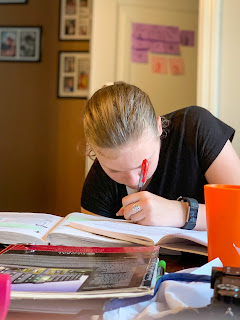I always wanted to use the Dictation plans included in Heart of Dakota. I tried it with my older daughter. She hated dictation. She had come from public school and spelling was what she knew. She asked for the spelling lists. She likes the Word Building compared to the dictation. So, I let her continue with it.
But then came my youngest. She is the one that has never attended public school. She tried the Word Building paces and began to dread them. (She wasn’t a big fan of workbook curriculum.). With her, I thought, I could start her with dictation and see if it was truly something that I could trust to give my child a good spelling foundation.
She likes dictation. Even when we wandered through a couple years of delight directed studies, we stayed with dictation. Occasionally we got our dictation out of McGuffey Readers. Mostly, we used the dictation provided in the Heart of Dakota guides.
I love the seamless, steady progress of the passages. I love that my daughter is putting words into writing, not just memorizing lists. I love that we can take the time for her to study the passage so she can learn it in her own way.
Her spelling is good. Occasionally she misses a word and must redo the passage. She’s a bit of a perfectionist and gets easily frustrated when she misses, but I just keep encouraging her and we progress slowly forward.
The spelling and grammar carry over to her other schoolwork, also. Spelling errors are infrequent. I believe this is because when you are reading quality literature and writing often, you naturally pick up how words are spelled by seeing and writing them correctly in context often. With that comes vocabulary, grammar, sentence structure, and a host of good writing habits.
We will continue dictation through high school. I love to read blog posts from the Heart of Dakota sisters (Carrie and Julie) about how dictation skills carried over into other areas of schoolwork and into college.
Here are a few posts they have written about dictation:
As you can see, using dictation instead of spelling has many benefits.
The dictation passages chosen by Heart of Dakota come from an older book set used in schools long ago. They were published in the early 1900s. The books are called Dictation Day by Day by Kate Van Wagenen. With each level, new words are in bold. Many of the passages are from quality literature or are quotes from famous men and writers. These writers consist of Ralph Waldo Emerson, Henry Wadsworth Longfellow, Abraham Lincoln, Benjamin Franklin, Oliver Wendell Holmes, Shakespeare, and Daniel Webster... to name a few. They come from quality works like The Bible or other great works of literature. Not only are the students learning spelling, grammar, and sentence structure, they are exposed to great snippets of writing and the thoughts of great men and women in history.
In our home, we have developed a system or routine for dictation. Dictation is part of our morning time studies, which also include Bible time, Writing, Language Arts, math, and Drawn Into the Heart of Reading (Literature) assignments.
We keep dictation simple. On day 1 of a new passage, it is used as copywork. We do this because I think it is a good practice to write to learn. By copying the passage exactly, my daughter is cementing the spelling of new words, seeing which words are capitalized, and where punctuation goes.
On day 2, the passage is dictated to her, phrase by phrase. She has to write it perfectly again. The Heart of Dakota guide books say that, if there is a mistake, she corrects the error, again cementing the correct spelling in her brain, and then redoes the passage the next day. Most of the time that is what we do. Occasionally the mistake is simple and she corrects it as soon as she sees it. In that case, we will often just move on to the next passage. However, many times the error is one where I insist the passage be redone. The next day she will redo the entire passage through me restating it, phrase by phrase. She rarely has to repeat a passage more than once.
Having used this method now for several years, I am impressed with the simplicity of this Charlotte Mason method. It takes only a few minutes a day, but the slow, steady, incremental growth is apparent when we see how far we progress from the beginning of a year to the end. Often we cover more than one level in a school year. And while a small snippet may not seem like much in the day to day, it adds up to a quality education.
Spelling is one of those subjects that, coming from a public school mentality, is the most difficult to release. Dictation is a natural way to learn not just spelling, but writing and grammar. And while we do separate writing and grammar programs, trusting dictation to be enough for spelling is scary at first. It has been ingrained that we need those lists and rules. Heart of Dakota asks that parents give dictation at least a year before trying to measure progress because it is a different way to learn from the way we all grew up with in the schools.
The early years of dictation actually do begin with lists. As a child is beginning to learn the write, each word in a list follows a spelling pattern, such as: grow, show, tow, throw, stow, etc. After a year or so of the lists, the first dictation passages are introduced. Spelling patterns are repeated with extra words added that match the dictation. For instance, the very first dictation passage is:
Sue has a bird.
It can call and sing.
king ring wing
This begins the gentle, incremental climb that continues through graduation.
I can attest that I have seen the growth and it more than covers the lists. Each week, with just three different dictation passages, there are fifteen to twenty new words (at my daughter’s current level.). The upper levels of dictation are quite challenging, with longer paragraphs being included of top quality works that hold a depth of sentence structure and a rich vocabulary that makes those lists a sad substitute. So while the earlier dictation passages are simple, through the years they advance to impressive levels.
I encourage other homeschool moms to try dictation for a year. If you hate it, the lists will always be there. There is no shortage of spelling programs, both free and expensive, available. Dictation is different. I believe it is better than the lists. I wish I would have stuck with it with my older daughters. While they are good spellers, using a dictation program teaches so much more than how to spell.








No comments:
Post a Comment